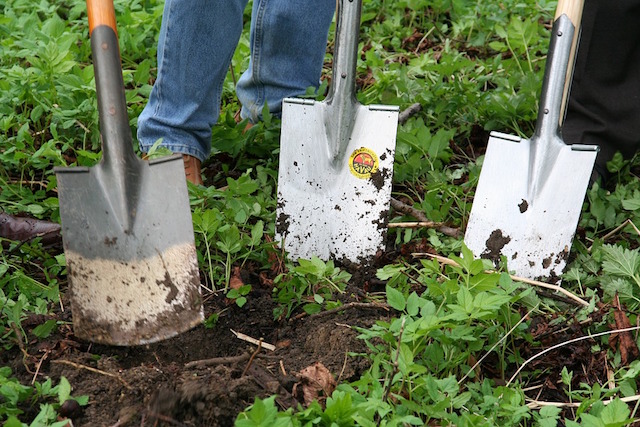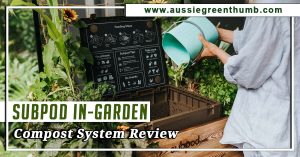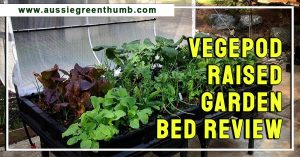This week one of our readers, Mackenzie Fox, has written in to share an article with Aussie Green Thumb on how best to look after your gardening tools, with some simple tips for getting more out of your gardening gear. Take it away Mackenzie!
One of the most important (and often overlooked) aspects of gardening is knowing how to care for your gardening tools. My own collection of gardening tools cost upwards of…you know what, I’m not going to say, but it’s a lot. For the amount of money I spent on them, I want them to be in good condition for a very long time to come.
So, let’s sort the tools into groups and have a look at what proper maintenance needs to be done on them:
Gardening Tool Care and Maintenance
Cutting tools
Sharpening garden shears and other cutting tools needs to be done regularly to keep them in good working condition. Make sure you use eye and hand protection before doing this!
Secure your tool firmly, remove rust with a wire brush and use lubricating oil (not petroleum oil) on the blade before you begin to sharpen it. Make sure you don’t sharpen it too much, as a too-sharp blade will just get damaged more easily.
Digging tools
Always clean spades and trowels thoroughly after use – just regular water from a hose should do the trick. If your tools have been exposed to fertiliser or any other chemical, make doubly sure you give them a good clean, because gardening chemicals tend to make short work of metal.
Remember that the best digging tools are ones that are easy on your hands! You can work towards a healthy spade handle by rubbing boiled linseed oil on it, which will prevent it from splintering and make it last a lot longer.
Simply rub it on with a cloth, let it absorb for a while, and then rub it off. (Then, make sure you throw the cloth away, as leaving oil-covered cloths lying around in a shed is a major fire hazard.)
Mowers
Always make sure to be very careful and wear protective equipment whilst working on your mower. They’re very useful tools, but they are dangerous ones. And don’t let your children near it, either!
Be sure to frequently clean out the undercarriage (disconnecting the spark plug first) where the grass will have stuck. Use a simple brush and hose to get rid of it all.
More blade sharpening may be involved at some point to keep the lawnmower blade in good condition. Some people can do this themselves, but if you’re not experienced in blade sharpening it’s best to pay a professional to do it. It’s fairly inexpensive.
And lastly, make sure to always drain the gasoline after you’ve used your mower. Old fuel is very bad for it. Use fresh gas at the start of every mowing season.
Power tools
Again, make sure to wear protective equipment whilst maintaining (and using, for that matter) power tools.
Frequently check your tools for damage, and check the blade brake every time the tool is used. If anything is wrong, call in a professional to repair it – never try and fix it yourself if you don’t know what you’re doing.
The moving parts of your tool can be sprayed with machine oil to keep them in good condition. Turn on the tool to ensure the oil reaches all of it.
But don’t forget about one other very important thing: storage! When winter comes, you may need to store your tools away for a long time. Here’s what you need to remember when the weather turns cold and the tools go into the garden shed:
- Tools should never be wet when they’re placed into storage! This will cause rust and rot, and give you a nasty surprise when you go to retrieve them.
- Having a sturdy assembled steel shed, rather than a wooden one, is recommended. Mine also has security features added on in order to protect the power tools from being stolen.
- Remove the batteries from whatever tools require them, and store them somewhere in the house – not in the shed, though, because any extreme cold will affect it.
- Make sure to drain any excess water from your garden hose before you store it away, otherwise if the water inside it freezes the hose could be ruined.
- If you’re not sure how to store something, check the manual! This is why I always keep manuals. Make an extra drawer inside your shed for them if possible.
- And don’t forget to drain the gasoline from anything that uses it!
Published on January 27, 2016 by Jim Horton
Last Updated on April 7, 2022






Really great info. Actually, I’m a new gardener and need some gardening tool. I had visited .toolsidea blog and got some idea. It would be very helpful if you have any suggestion. Thanks